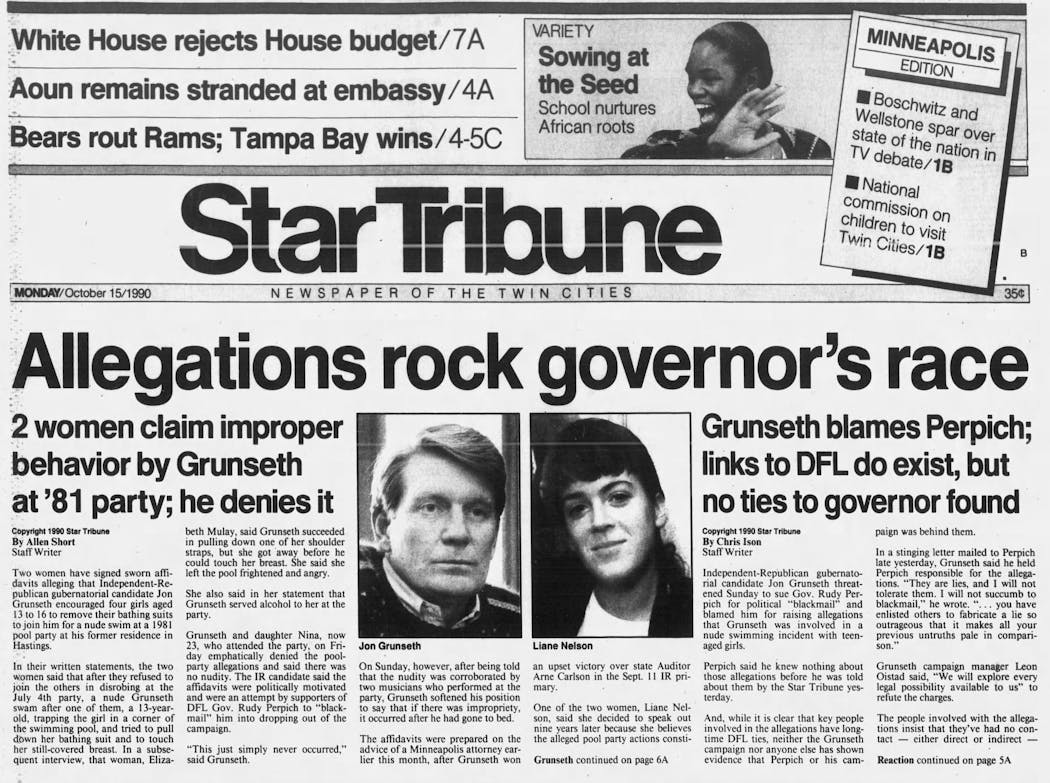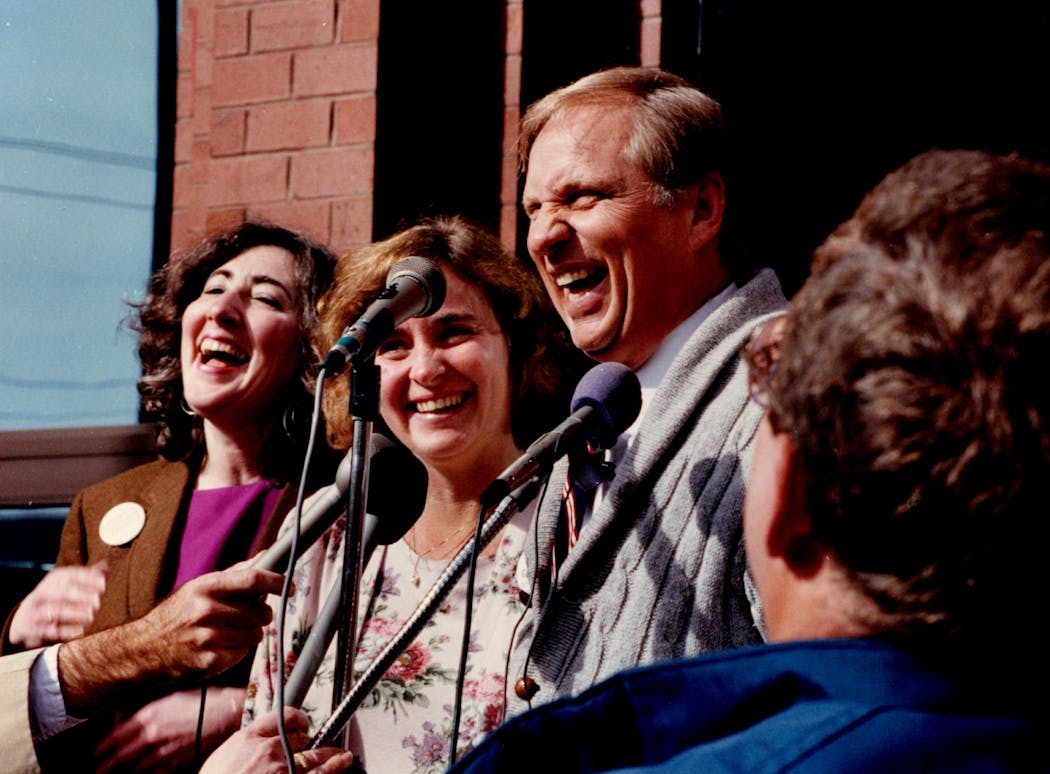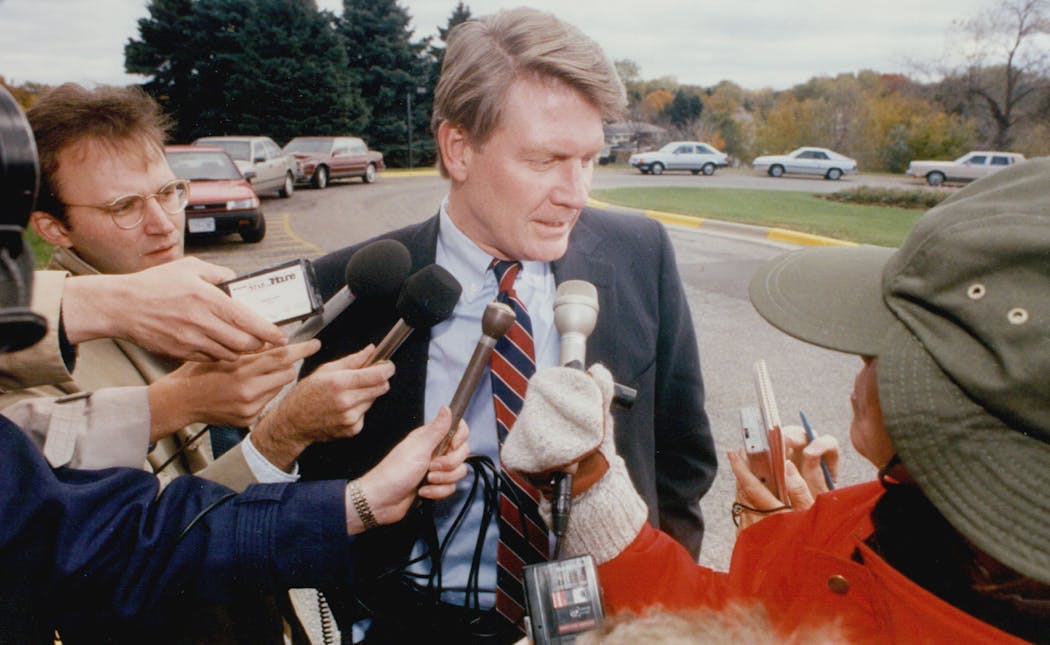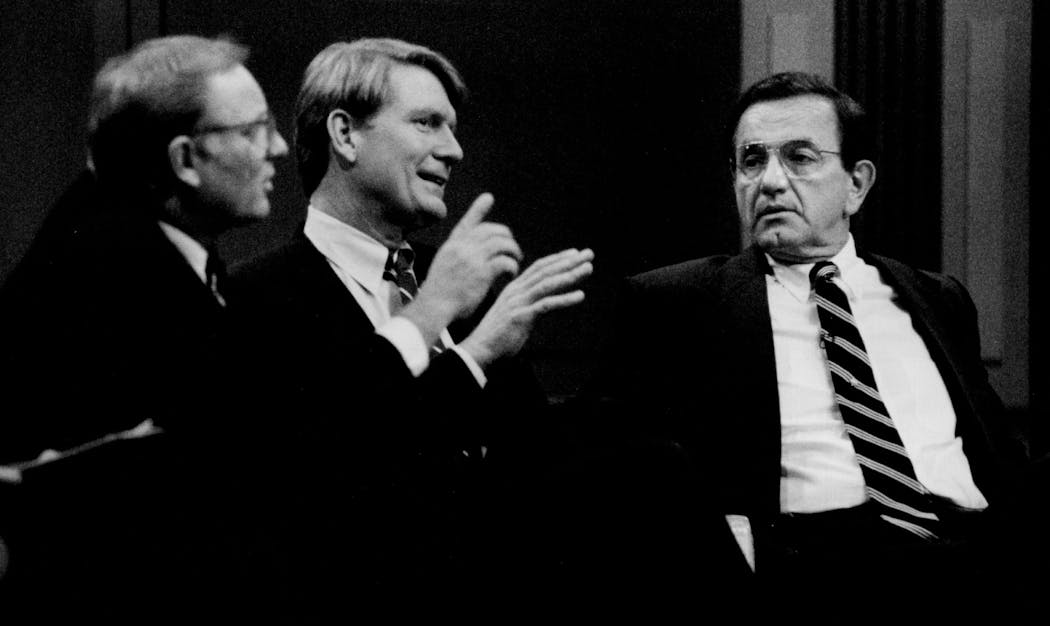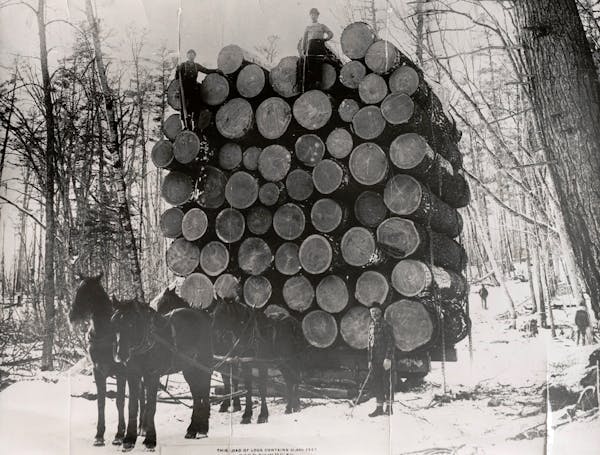Did a TV debate decide one of Minnesota's most scandalous elections?
Listen and subscribe to our podcast: Via Apple Podcasts | Spotify | Stitcher
It's been just over three decades since a sex scandal resulted in a last-minute candidate becoming governor in an upset, one of Minnesota's most bizarre elections.
In 1990, Republican-endorsed gubernatorial candidate Jon Grunseth withdrew from the race just nine days before Election Day amid a cloud of allegations. The man he shellacked in the primary, Arne Carlson, replaced him on the ballot and defeated DFL incumbent Rudy Perpich, the longest-serving governor in the history of the state.
It was a momentous event in local politics and people like Bill Hanley are still thinking about it. Hanley is a former executive vice president of Twin Cities Public Television who oversaw a crucial debate a week and a half before the election. He sought answers from Curious Minnesota, the Star Tribune's reader-powered reporting project, about whether that debate was decisive in Carlson's victory.
"This campaign was so nuts and there were so many weird things," Hanley said. Carlson's entry into the race happened so late that there had been no polling to show his strength. TPT had a rule that a candidate had to register at least 5% in the polls to be included in a debate. Hanley agonized over what to do, but decided to include Carlson.
The debate between Grunseth, Carlson and Perpich remains the highest-rated locally produced show in TPT history, according to Brendan Henehan, the debate's producer. Its 11.4 rating translates to a viewership of about 150,000, he said.
Curious Minnesota questioned a number of people involved about the debate's impact, including Carlson, who went on to serve two terms as governor and Grunseth, a businessman who subsequently left politics — and the country.
The allegations
Grunseth's campaign imploded three weeks before the election.
Two women said that nine years earlier they attended a party at Grunseth's home in Hastings. Around midnight, Grunseth encouraged four girls, ages 13 to 16, to remove their bathing suits and join him for a nude swim, according to the allegations published in the Star Tribune.
After the two girls refused to disrobe, they alleged that "a nude Grunseth swam after one of them, a 13-year-old [Elizabeth Mulay], trapping her in a corner of the swimming pool," the newspaper reported. He then "tried to pull down her bathing suit strap and touch her still-covered breast," but she got away before he could do so, the paper said.
Mulay and another woman signed affidavits about the incident and other witnesses corroborated parts of the story. But Grunseth and his daughter Nina, who attended the party, emphatically denied the pool party allegations and said there was no nudity.
"This just simply never occurred," Grunseth told the newspaper.
Grunseth claimed Perpich had put the women up to the disclosure, which Perpich and the women denied. Grunseth noted that the women's lawyer, Robert Tennessen, a former state senator, was a Democrat who supported the Perpich campaign. But Grunseth produced no evidence that Perpich was involved.
"If Perpich had anything to do with it we certainly were unaware of it," said Allen Short, a former Star Tribune reporter who broke the news, in an interview. "To my knowledge the two young ladies had nothing to do with Mr. Perpich."
Meanwhile, the St. Paul Pioneer Press had its own interview with Grunseth and asked him whether he had affairs. "Grunseth does not deny that he had extramarital affairs," the paper reported.
"I think it's fair to say that there was a period in my life through the late '70s and early '80s when I was very much a warm-blooded American male," Grunseth told the paper.
Those remarks and how they were framed in the article may have been more damaging to the campaign than the pool accusation because it "came from Grunseth's own mouth," according to the 1991 book "There is No November," an account of the campaign written by Grunseth's campaign manager and press secretary.
Carlson, who was state auditor and lost the primary, began a write-in campaign and recalls a huge surge of support for his candidacy. He said crowds gathered outside the window of his auditor's office in St. Paul, urging him to run. "I was perfectly willing," Carlson said with a laugh.
The debate
TPT held the only debate of the general election 11 days before Election Day. Hanley said the decision to include Carlson was "a tough call." He also decided at the time to have it run an extra half-hour, with the first hour devoted to standard issues of policy and the last half-hour on the scandal.
The debate was tense.
"Perpich kept looking at his watch," recalled Karen Himle, who was the debate moderator. "Jon Grunseth had his right fist held in his left hand. He was uptight. Arne's demeanor was relaxed, engaged, as opposed to Grunseth and Perpich."
The candidates were interviewed by local reporters. One of them, Lynda McDonnell of the Pioneer Press, now retired, pressed Grunseth on the "warm-blooded" remark. Grunseth responded he was referring to earlier dalliances rather than the affair.
But further bombshells would drop following the broadcast.
Two days later, the Star Tribune published an article by Short and Paul McEnroe, saying a 32-year-old Minnetonka woman alleged she and Grunseth had an intermittent, nine-year sexual relationship that occurred during both Grunseth's previous marriage and his current one.
She said that only the year before they spent the night together at a hotel in Washington, D.C. It was corroborated by a friend and the Star Tribune cited a receipt it obtained showing Grunseth stayed at the hotel. Grunseth said the affair ended in the early 1980s and that they had only met for cocktails at the hotel.
But the pressure was too great. Grunseth withdrew from the race hours after the story was published.
The Independent-Republican Party's executive committee voted that it lacked "an appropriate committee" to select a new candidate. So under state law, the spot on the ballot went to the second-place primary finisher: Carlson.
Carlson defeated Perpich on Nov. 6 in a stunning upset. He won by nearly 60,000 votes, a 3.3 % margin of victory.
A difference maker?
So what role did the debate play in Carlson's victory?
"It had an impact because of the audience size," says Larry Jacobs, a professor at the Humphrey School of Public Affairs. "The size itself was an event. It culminated the mushrooming scandal around his campaign and [Grunseth] was unable to effectively put the questions to rest."
The debate "gave Arne legitimacy even though he lost the primary," said John Stanoch, Perpich's campaign manager. "It certainly refreshed and legitimized Carlson."
Carlson believes the debate played a "huge difference in the outcome." He says he received an outpouring of support that he had never seen before or since, such as 150 people awaiting the arrival of his plane in Mankato.
"It was like Charles Lindbergh landing in Paris," Carlson quipped.
Paul Anderson, who chaired Carlson's campaign committee and later was appointed by Carlson to the state Supreme Court, was surprised that TPT invited Carlson to the debate. He believes it was very important to the race.
"It gave [Carlson] equal status to the other two," Anderson said, adding that "he came across as well as the rest of them."
Elizabeth Mulay and Nina Grunseth have since died. Liane Nelson, who was at the Grunseth pool that night and was quoted in the original newspaper report, supporting Mulay's allegation, stands by her account.
"Everything that was in the Star Tribune was true," she said.
A new life
Grunseth still denies the pool party allegations.
"The pool party story was BS and the mother of all hit jobs," Grunseth wrote in a recent email to the Star Tribune. "It took a very innocent 4th of July party and used it to portray me as something evil. As to the affair, I never denied it, what was in contention was, when, where etc."
He said the debate had "virtually no impact at all." Grunseth instead blamed the Star Tribune for his defeat, saying "what determined the events of the day is what Allen Short and Paul McEnroe wrote, with the blessings of their editors."
Grunseth moved to Tasmania, the island state of Australia in 1994 to start a telecommunications company, he said. He sold his share of it in 1999, bought 800 acres on Tasmania's Bruny Island and planted 16,000 cherry trees. He said the orchard became a major exporter of cherries to north Asia and Europe.
Grunseth later divided his time between his cabin on Lake Superior and Nice, France, where he met his current wife. He said they now live on an island in the Hebrides off the Scottish coast "where they make excellent scotch."
"Now I have had, ironically thanks to the Strib, an amazing life since 1990," Grunseth wrote. "So thanks!"
If you'd like to submit a Curious Minnesota question, fill out the form below:
Read more Curious Minnesota stories:
Why is the Minnesota Legislature's session so short?
When's the last time a Republican won a majority in Minnesota statewide?
Why can't Minnesotans bypass the Legislature to change state laws?
Why doesn't Minnesota's governor pardon the ceremonial turkey?
Who was the first woman to serve in the Minnesota Legislature?
Why was the career of Minnesota's first congresswoman cut short?
